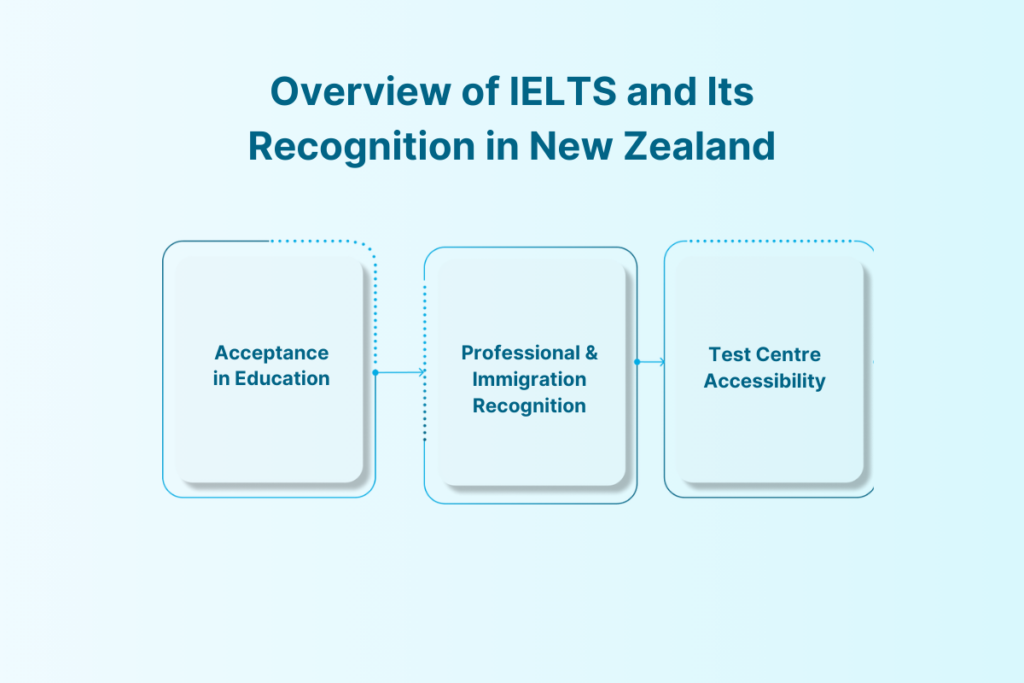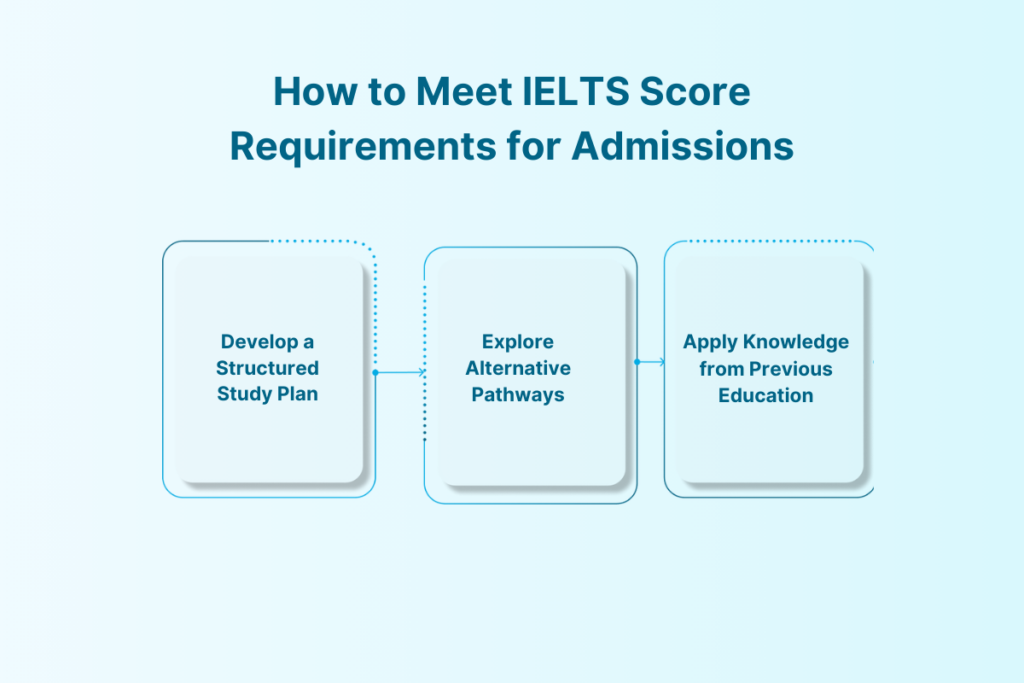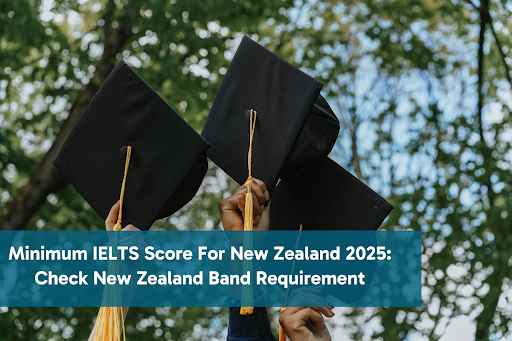The success of your New Zealand education application depends heavily on you getting the right IELTS score for study admission. The number of international students studying in New Zealand increased by 24% during 2024, with over 73,000 students choosing New Zealand as their academic destination.
Your IELTS score for New Zealand is what determines your admission eligibility and also plays a very important role in securing a student visa, work permits and even permanent residency. The visa application process becomes smoother when you research and understand your institution’s requirements and visa criteria.
This guide covers everything you need to know about the IELTS requirement for New Zealand that students need for admission to New Zealand universities.
Key Highlights
Here is a quick overview of everything you will learn in this blog.
Choose your dream country
When do you want to study abroad?
What's your highest level of education?
Select you current city
How Leap will help you
Personalised University Shortlist
Express Applications with Quicker Admits
End-to-End Application Support
| Aspect | Details |
|---|---|
| Minimum New Zealand IELTS Requirement for Student Visa | UG: 6.0 PG: 6.5 |
| Minimum IELTS Score for New Zealand Permanent Residency (PR) | Minimum 6.0 |
What is the IELTS Exam?
The International English Language Testing System (IELTS) allows universities, immigration authorities and employers to standardise their evaluation of candidate English language skills.
The evaluation system combines English language skills assessment into one standardised format containing reading, writing, listening and speaking aptitudes. Standardised testing methods examine all writing-related abilities through their assessment process.
New Zealand accepts two IELTS formats:
- IELTS Academic: Required for university admissions and professional licensing.
- IELTS General Training: Needed for work visas, permanent residency (PR), and vocational training.
IELTS exists as the leading English assessment that people can easily access when pursuing academic admission or immigration to New Zealand for work purposes. This educational organisation operates more than 1200 assessment centers throughout the world.
Also Read: IELTS Exam for Study Abroad: Your Ultimate Guide to Success in 2025
Overview of IELTS and Its Recognition in New Zealand
While several English proficiency tests are available, IELTS remains a top choice for New Zealand-bound applicants. Let’s explore how it is recognised across education, employment, and immigration.

1. Acceptance in Education
Top New Zealand universities, including the University of Auckland, Victoria University of Wellington, and University of Otago, require IELTS for admission. The required scores vary by institution and programme, ensuring that students meet academic language standards.
2. Professional & Immigration Recognition
The New Zealand Qualifications Authority (NZQA) and Immigration New Zealand (INZ) use IELTS scores to decide both skilled migration eligibility and licensing. Employers from health care and engineering fields, together with customer service branches, examine IELTS test results while conducting candidate selection for international employment.
3. Test Centre Accessibility
More than 1,200 worldwide test facilities provide students from all regions with easy access to IELTS exams. New Zealand students have several testing locations across the country to easily achieve their required examination results.
Why Choose IELTS Over Other English Tests?
Selecting a proper English test affects your opportunity to study or work in New Zealand. Organisations throughout New Zealand choose IELTS because it provides a thorough evaluation and tests spoken English in a trusted measure.
Minimum IELTS Score for New Zealand (Study, Work, PR)
More and more students from across the globe view New Zealand as a favorable destination for international education. The increasing number of people seeking opportunities in New Zealand creates a requirement for successful IELTS score completion to obtain study, work and permanent residency visas.
Also Read: IELTS Exam Eligibility 2024-2025
IELTS Score for New Zealand Student Visa
New Zealand had approximately 66,147 student visa holders in January 2025, representing a 23.1% increase compared to the previous year. It is expected to see a significant increase in student visa applications for 2025.
The process of getting a New Zealand student visa depends strongly on meeting the necessary IELTS score requirements. So, how much band required for New Zealand student visa?
This table shows the required minimum IELTS band requirement for New Zealand study visa:
| Study Level | Minimum Overall IELTS Score | Minimum Band Score |
|---|---|---|
| Diploma & Certificate Courses | 5.5 | 5.0 |
| Undergraduate Degrees | 6.0 | 5.5 |
| Postgraduate Degrees | 6.5 | 6.0 |
| Research & PhD | 7.0 | 6.5 |
IELTS Score for New Zealand PR
You need a strong IELTS score to secure PR under New Zealand’s Skilled Migrant Category (SMC). It proves your ability to integrate into the workforce and society.
The table below outlines the New Zealand IELTS band requirement for PR:
| PR Eligibility Level | Minimum IELTS Score | Requirement |
|---|---|---|
| Skilled Migrant Category (SMC) | 6.5 overall | Mandatory for eligibility |
| Partner & Dependent Visa | 5.0 overall | Required if the principal applicant does not meet the exemption criteria |
| Investor & Business Visas | 5.0 to 6.5 overall | Varies by visa type and investment level |
Higher scores improve PR prospects by improving employability, communication, and adaptability in New Zealand. While 6.5 is the minimum for SMC, scoring higher can strengthen your application.
IELTS Score for New Zealand Work Visas
For work visa in New Zealand, there are specific IELTS score requirements. These scores vary depending on the visa category and the nature of the job offered.
Below is an overview of the New Zealand band requirement for various work visa categories:
| Work Visa Type | Minimum IELTS Score | Requirement |
|---|---|---|
| Accredited Employer Work Visa (AEWV) | 4.0 overall | Needed for low-skilled roles (ANZSCO 4 to 5) |
| Essential Skills Work Visa | 4.0 to 6.5 overall | Varies by job skill level |
| Working Holiday Visa | 4.5 to 5.5 overall | 4.5 (Vietnam, Turkey, Thailand, etc.)5.5 (China) |
IELTS Score Requirements for New Zealand Universities
New Zealand's universities are globally recognised for their academic excellence, attracting students from around the world. To gain admission, there are some IELTS score requirements that international applicants must meet.
Top New Zealand Universities and Their IELTS Requirements
Each university in New Zealand sets its own IELTS score requirements based on the level of study and program. The table below provides a detailed breakdown of the minimum IELTS scores needed for admission to New Zealand's top-ranked universities in 2025.
| University | QS World Ranking 2025 | Minimum IELTS Score |
|---|---|---|
| University of Auckland | 68 | 6.0 (UG), 6.5 (PG) |
| University of Otago | 206 | 6.0 (UG), 6.5 (PG) |
| Victoria University of Wellington | 236 | 6.0 (UG), 6.5 (PG) |
| University of Canterbury | 258 | 6.0 (UG & PG) |
| Massey University | 284 | 6.0 (UG), 6.5 (PG) |
| University of Waikato | 331 | 6.0 (UG), 6.5 (PG) |
| Lincoln University | 368 | 6.0 (UG), 6.5 (PG) |
| Auckland University of Technology (AUT) | 486 | 6.0 (UG), 6.5 (PG) |
IELTS Score for Undergraduate & Postgraduate Programs
The IELTS score requirement for studying in New Zealand varies based on the level of education. Undergraduate programs generally have a lower English proficiency requirement, while postgraduate courses demand a higher level of academic communication skills.
The table below outlines the minimum IELTS scores required for different study levels in New Zealand:
| Study Level | Minimum IELTS Score |
|---|---|
| Diplomas & Certificates | 5.5 (no band < 5.0) |
| Bachelor’s Degrees | 6.0 (no band < 5.5) |
| Master’s Degrees | 6.5 (no band < 6.0) |
| PhD & Research Programmes | 7.0 (no band < 6.5) |
How to Meet IELTS Score Requirements for Admissions?
International students seeking admission to New Zealand universities need to plan their IELTS preparation effectively because the set score requirements might not be achievable for some applicants. Students who follow a structured plan for study and engage in regular practice will execute better on their IELTS tests.
Here's how you can enhance your chances:

1. Develop a Structured Study Plan
- Assess Your Level: Take a diagnostic test to identify strengths and areas for improvement.
- Set Goals: Determine the required IELTS score and create a study timeline.
- Daily Practice: Spend daily hours on official IELTS materials to practice the listening, reading, writing and Speaking sections.
- Enroll in Courses: Join IELTS preparation courses for structured guidance.
Also Read: IELTS Speaking Practice Test
2. Explore Alternative Pathways
- Foundation & Pathway Programs: Offered by some universities for students who don’t meet direct entry requirements.
- English Bridging Courses: University-provided courses to enhance proficiency.
- Pre-sessional English Courses: Short-term programs for students slightly below the IELTS requirement.
3. Apply Knowledge from Previous Education
- Medium of Instruction: IELTS can be waived if prior education was in English.
- Alternative Tests: Consider other accepted English proficiency exams.
Through strategic implementation along with exploring various options, you will improve your English skills and achieve the needed IELTS scores for university entry.
IELTS vs IELTS for New Zealand: Which One is Better?
When considering English proficiency tests for New Zealand, both the International English Language Testing System (IELTS) and the Pearson Test of English (PTE) are accepted. Understanding how their scores correspond can help you make an informed decision.
Score Conversion: IELTS vs. PTE
Both tests have distinct scoring systems. Here's a comparison of IELTS and PTE across key aspects to help you decide which test suits you best:
| Feature | IELTS | PTE Academic |
|---|---|---|
| Scoring Range | 1 to 9 Bands | 10 to 90 Points |
| Test Format | Paper-based & Computer-based | Fully Computer-based |
| Speaking Assessment | Human Examiner | AI-Based Scoring |
| Acceptance | Widely accepted for study, work, and migration | Accepted globally, including by New Zealand institutions & immigration authorities |
| Result Time | 2 to 5 days (Computer-based), 13 days (Paper-based) | Typically within 48 hours |
In December 2020, Pearson updated their score equivalencies, indicating that higher PTE-A scores are now required to match higher IELTS bands (7 to 9).
Here's a comparison of equivalent scores:
| IELTS Band Score | PTE Academic Score |
|---|---|
| 4.5 | 23 |
| 5 | 29 |
| 5.5 | 36 |
| 6 | 46 |
| 6.5 | 56 |
| 7 | 66 |
| 7.5 | 76 |
| 8 | 84 |
| 8.5 | 89 |
| 9 | 90 |
Understanding these factors and the score equivalencies can guide you in selecting the test that aligns best with your strengths and requirements.
Also Read: IELTS Listening Band Score: Calculator, Chart & Scoring Details
How to Improve Your IELTS Score for New Zealand?
The large number of international candidates who take IELTS yearly makes scoring well in this examination. The essential element for fulfilling New Zealand’s IELTS requirements for study, residency, and work eligibility involves an organised preparation strategy.
Best Preparation Tips for Achieving Your Target Score
To succeed in IELTS, candidates need an organised preparation approach which strengthens their capabilities in the Listening, Reading, Writing and Speaking sections. One can enhance performance by setting specific targets while using official materials and conducting realistic testing conditions.
Below are some of the best strategies to help you achieve your target IELTS score and improve your chances of studying or working in New Zealand:
- Set a Clear Goal: Identify the IELTS band required for New Zealand for your visa or university admission. Aim slightly higher to ensure eligibility.
- Enhance Your Vocabulary: Expand your word bank by reading academic articles, watching English news, and practising new words daily.
- Simulate Test Conditions: Time yourself during practice sessions to improve speed and accuracy in reading, writing, and listening.
- Refine Your Speaking Skills: Engage in English conversations daily and record your responses to analyse fluency, pronunciation, and coherence.
- Familiarise Yourself with Question Types: IELTS questions follow specific patterns. Reviewing past papers can help you anticipate question formats.
Practice Tests & Study Resources
Using the right study materials and taking regular practice tests are essential for improving your IELTS score. Practicing under exam-like conditions helps build confidence, improve time management, and identify areas that need improvement.
Below are some recommended study materials to help you achieve your desired score:
| Study Material | Description |
|---|---|
| British Council IELTS Prep | Free sample tests for Academic and General Training. |
| IDP IELTS Online | Official IELTS practice platform with detailed performance feedback. |
| Leap Scholar | Comprehensive IELTS practice tests to help achieve target scores. |
| Cambridge IELTS Series | Past exam papers with examiner comments for targeted preparation. |
| Magoosh IELTS Prep | Video lessons and AI-powered practice tests. |
| Road to IELTS (British Council) | Interactive exercises, video tutorials, and full-length practice tests. |
| IELTS Trainer by Cambridge | Step-by-step guidance with six practice tests. |
Common Mistakes to Avoid in the IELTS Exam
Many test-takers also struggle with staying on topic in writing tasks and overlooking grammar and spelling errors. Understanding common pitfalls and knowing how to avoid them can help you maximise your score.
Below are some of the most frequent IELTS mistakes and how to prevent them on test day:
- Ignoring Instructions: Always check word limits and follow specific question guidelines.
- Lack of Expression in Speaking: Avoid monotone answers. Add natural pauses and emotions to sound more fluent.
- Straying from the Topic: Ensure your writing stays relevant to the prompt to maintain coherence.
- Mismanaging Time: Allocate time wisely. Don’t spend too long on one section at the cost of another.
- Neglecting Grammar and Spelling: Small errors can lower your Writing and Listening scores. Also, proofread whenever possible.
- Skipping Answer Checks: Use any extra time to review your responses, especially in Reading and Listening.
Scoring high on IELTS for New Zealand is achievable with the right preparation strategy. By following these techniques and avoiding common mistakes, you can improve your chances of success.
Securing a strong IELTS score for New Zealand is achievable with the right approach and consistent effort. You can get expert guidance and personalised feedback by enrolling in the LeapScholar IELTS Masterclass now!
Frequently Asked Questions
-
Q. What is the minimum IELTS score for New Zealand?
A. The minimum score required depends on what visa type a person needs. To get a student visa, candidates must achieve at least 5.5 bands. Typically, work and PR visas require candidates to achieve at least 6.5 in their IELTS test. Professional registrations might demand that applicants achieve test scores above the basic specified levels.
-
Q. Is New Zealand good for Indian students?
A. Yes, New Zealand delivers a superior educational experience with post-graduation employment authorisation and immigration options to produce an ideal study destination for Indian students. The country allows students to meet their New Zealand student visa IELTS requirements through adaptable standards.
-
Q. What is the IELTS score for New Zealand?
A. New Zealand immigration needs students to achieve a specified level of IELTS based on the visa category. Students applying for undergraduate degrees must present a 6.0 IELTS band, yet postgraduate programs and New Zealand work visa IELTS requirements are above 6.5.
-
Q. Which university accepts 5.5 in New Zealand?
A. Some universities and institutes like Waikato Institute of Technology and Otago Polytechnic welcome students with a minimum IELTS score of 5.5 for diploma admission. Certain universities operate foundation programs which assist students in fulfilling the language criteria for complete degree enrollment.
-
Q. How many intakes are there in New Zealand?
A. Almost all universities operate with two enrollment periods, which are February and July, but some provide alternate enrollment dates during April and September and November, based on the specific program. The course structure determines the extra intakes at educational institutions, which occur in April, September and November. All students should verify deadlines available at their target universities.
-
Q. Is IELTS mandatory in New Zealand to study?
A. The admission requirements specify that IELTS should be submitted for enrollment. However, some institutions approve alternatives like PTE or TOEFL. Foundation courses also serve as a way for students to achieve minimum English language standards when their IELTS scores do not fulfill university requirements.
-
Q. Which courses are in demand in New Zealand?
A. The highest-demand careers in New Zealand include IT, healthcare, and engineering alongside business industries. Professionals can use these sectors for securing employment because they match requirements for skilled immigration and work permits for New Zealand.
-
Q. How many times can I appear for the IELTS exam?
A. People can take the IELTS test without any predetermined number of attempts. Candidates can repeat their test to reach the score necessary for obtaining a New Zealand student visa, work visa, or permanent residency application.
-
Q. Is 7.5 a bad IELTS score?
A. A 7.5 band score presents an excellent performance which goes beyond the minimum requirement for both university admission and New Zealand skilled migration programs. Your academic success increases together with your eligibility for PR status as you attain entrance to leading universities.
-
Q. What are the perks of studying in New Zealand?
A. The country provides both economical education fees and internationally valid degrees alongside working permits and opportunities to obtain permanent residency. The country provides students with both safe surroundings and premium life standards with part-time job opportunities while earning their degrees.
















Have Questions? Get Guidance to reach your Dream University
Connect with India's finest counsellors and biggest study abroad community.
Get Guidance